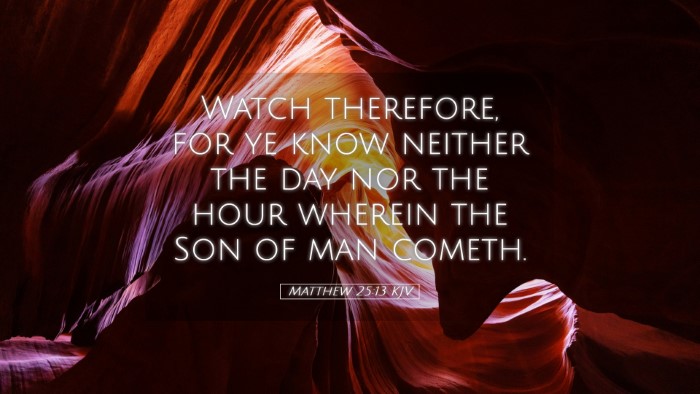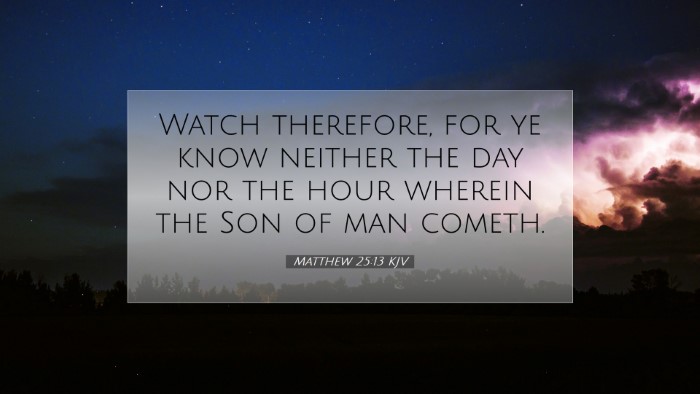Matthew 25:13 - Watch Therefore, for You Know Neither the Day Nor the Hour
Matthew 25:13 states, "Watch therefore, for you know neither the day nor the hour in which the Son of Man is coming." This verse concludes the parable of the ten virgins, a significant teaching of Jesus that emphasizes the necessity of vigilance in spiritual life. Below is a comprehensive commentary derived from several established public domain works.
Overview of the Parable
The parable of the ten virgins (Matthew 25:1-13) illustrates the importance of preparedness as it pertains to the coming of the Kingdom of Heaven. In this story, ten virgins await the coming of the bridegroom, signifying the return of Christ. Five of the virgins are wise and bring oil for their lamps, while the other five are foolish and neglect this essential preparation.
Key Themes
- Preparation. The oil represents faith and good works, essential components of a believer's life.
- Vigilance. Followers of Christ are called to be alert, emphasizing a lifestyle of watchfulness and readiness.
- The Unexpectedness of Christ's Return. The exact timing of Christ’s return remains unknown, underscoring the urgency for believers to be consistently prepared.
Commentary Insights
Matthew Henry's Commentary
Matthew Henry highlights the difference between the wise and foolish virgins. He explains that wisdom is associated with foresight and preparedness, while folly signifies neglect. The oil represents the grace of God, which is not transferable. Each individual must cultivate a personal relationship with God that allows for sustaining faith when challenges arise. Henry encourages believers to seek God actively and prepare themselves spiritually, as the call to "watch" is a reminder to live in expectation and readiness.
Albert Barnes' Notes on the Bible
Albert Barnes emphasizes the practical implications of being watchful. He asserts that watching implies an active engagement with one's faith. Barnes stresses that the call to watch is made more urgent by the uncertainty of the timing of Christ's return. The absence of a specific day or hour serves to motivate believers to live in a state of continual preparedness. He instructs that this vigilance should manifest in a life of holiness and service, underscoring the need for spiritual alertness against complacency.
Adam Clarke's Commentary
Adam Clarke delves deeper into the symbolism of the lamps and oil. He suggests that the lamps, which provide light, symbolize the Word of God, and the oil represents the Holy Spirit. Clarke points out that the need for fresh oil indicates that believers must continually seek the Holy Spirit's filling. The delay of the bridegroom represents trials and tribulations in life that test believers’ faith. Clarke’s analysis calls believers to renew their commitment and maintain a vibrant spiritual life as they await Christ's return.
Spiritual Applications
This verse serves as a poignant reminder for pastors, students, and theologians alike, emphasizing the continual monitoring of one's spiritual state. Here are some spiritual applications drawn from the commentary:
- Active Faith: Strive for a robust and active faith that is evident in good works and a consistent prayer life.
- Personal Responsibility: Each believer is responsible for their own relationship with God; reliance on others for spiritual sustenance is insufficient.
- Lifelong Vigilance: Cultivate a lifestyle that reflects readiness for Christ’s return, fostering communities that encourage mutual accountability in faith.
Conclusion
Matthew 25:13 encapsulates a crucial exhortation for the Christian community, leveraging the powerful metaphor of vigilance. As expressed by Henry, Barnes, and Clarke, the pressing call to "watch" transcends mere awareness; it demands a life reflective of preparedness, actively engaging with the facets of faith, grace, and the Holy Spirit. Believers are reminded that while the timing of Christ's return is unknown, our response must be one of readiness, actively embodying the principles of the Kingdom of Heaven in anticipation of the bridegroom's arrival. In closing, let us thereby encourage one another to remain steadfast, vigilant, and prepared as we await His glorious return.


